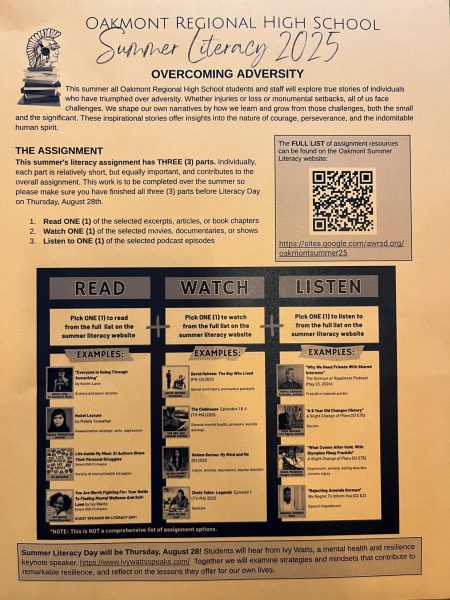Oakmont Intern: A Learning Experience in Dealing with Behavior

Oakmont Intern: A Learning Experience in Dealing with Behavior
By Maddie Ethier
It’s always helpful to have a career picked out before graduating high school. Getting the opportunity to get experience in that desired field of interest is more than ideal. An internship is a starting point for this.
At Oakmont, select seniors are given the opportunity to participate in internships at local businesses. These internships count as a class and are worked into student schedules, however that may be. They typically take place during A or D block.
During the second half of junior year, juniors at Oakmont meet with their school counselors to talk about college, future plans, and to select their senior year classes. If a clear career path has been decided – or at least thrown on the table – school counselors may suggest an internship to that student that would best prepare them for their desired future. Students may also express interest in an internship they’ve heard about.
School counselors then create a list of rising seniors who are signed up for an internship and consult with a coordinator, usually another Oakmont staff member. Formerly, the advisor was Mrs. Wendy LeBlanc, but is now Mr. Cote due to Mrs. LeBlanc’s early retirement.
This coordinator will reach out to supervisors of the internships and give them a list of students’ names who will most likely be taking part during the following school year. It is then up to the supervisors to reach out to the students to make plans to meet and discuss requirements, logistics, etc.
As for me, I’ve always wanted to be an elementary school teacher, and I shared this with my school counselor. He then informed me about an internship that I could incorporate into my schedule. I thought it would be a good thing for me to do, so I signed up.
The position I signed up for was an Extended Day Intern, where I would work at the before school program at either Briggs or Westminster Elementary and help supervise and guide the kids. This sounded like a lot of fun, and evoked my interest. The supervisor then reached out to me, and before the school year ended, I was all set to be staffed at Extended Day.
I started on the first day of school, scheduled to be at Briggs, or so I thought. I apparently had been moved to Westminster Elementary due to where I live, so I started there on the second day of school. I quickly realized how much the behavior of the students differed by their age groups.
For starters, I have observed the younger kids are more mild-tempered. They seem to be quieter and are more open to new experiences and ideas. However, several of the 4th and 5th graders have not been as willing to follow the rules. We’ve even gone as far as move their designated gym time so they now have 10 minutes instead of 20, and it’s been proven somewhat effective.
According to verywellfamily, school-age kids tend to push limits and attempt to get away with things, but they’re also experiencing immense mental and physical changes, and can be quite dependent on their parents or authority in general. Some kids tend to have issues socializing and respond to this in a negative way.
A student’s actions can also correlate with changes occurring in their lives. Maybe a student’s parents are going through a divorce and they have to cope with living at two different houses. Perhaps a student has to deal with a new baby in their household and has to live with the reality of getting less sleep, affecting their ability to control their actions.
In general, there are lots of reasons why kids act out. Kids have such big, untamed emotions and have to exert them somehow. This can lead to meltdowns and bouts of tantrums. Learning to control these emotions only comes with age and maturity.
Another huge factor is lack of discipline. A lot of times, parents don’t practice proper discipline with their children, leading to the subconscious assumption that bad behavior leads to reward. It’s important for kids to be taught that this should not come with a positive outcome.
ADHD can largely factor into kids’ conduct. It affects people of all ages, but in children, it can have more of an impact. Some kids need to be doing something at all times and can’t sit still, which can be a good thing.
Kids need this kind of mental and physical stimulation to start their day. The program starts at 7 am every morning, and a lot of the kids are tired when they first come in. Once they get moving, they’re more awake and alert.
Another thing the kids seem to enjoy is the daily craft. Usually, there’s a craft we have planned out for the morning, and I do the craft with them. Sometimes it’s as simple as coloring pages. Other times we do crafts like paper polar bears and making bracelets, or we’ll play with clay or play dough. No matter the craft, a lot of the kids seem to enjoy participating in it every morning. It helps the kids to wake up their minds.
Overall, my experience working at Extended Day has been very positive. It’s been a great opportunity and I would recommend it to anyone aspiring to be an elementary school teacher. It definitely gives you a feel for the career and can help determine whether or not it’s something you wish to pursue (you get paid as well!).
WC: 935
https://www.verywellfamily.com/normal-and-abnormal-behavior-warning-signs-1094839
https://www.verywellfamily.com/surprising-reasons-why-kids-misbehave-1094946

Maddie Ethier is a part of the Class of 2023 at Oakmont, and this is her third year writing for The Oakmonitor. She currently works at Market Basket. She...







